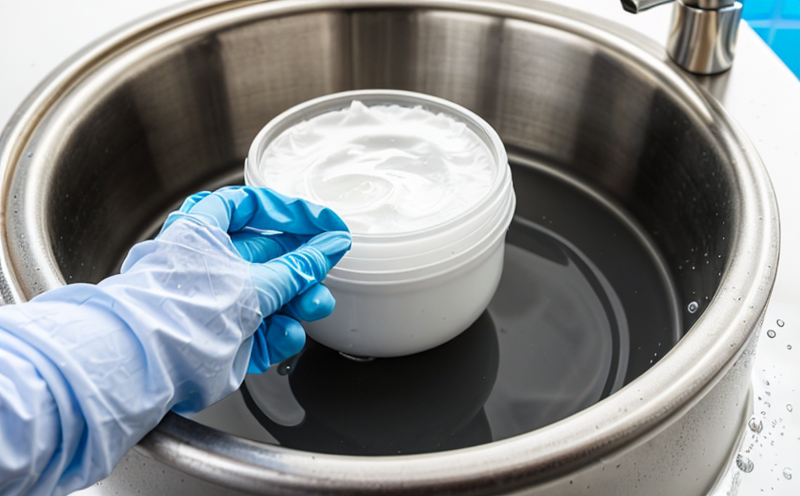Ship Cabin Cleaner Surfactant Testing
The testing of surfactants used in ship cabin cleaners is a specialized service that ensures the efficacy and safety of cleaning products used on vessels. This critical process involves rigorous analysis to meet the stringent requirements set by regulatory bodies like ISO, ASTM, EN, and IEC. The aim is to ensure that these surfactants are effective in removing dirt, stains, and odors while being safe for both human health and the environment.
Surfactants used in ship cabin cleaners must comply with a variety of international standards such as ISO 12955-3 for biodegradability, which is crucial given the marine environment. These surfactants are designed to break down organic matter quickly and safely, preventing any harmful effects on aquatic ecosystems.
The testing process begins with proper sample preparation, where the surfactant solution is diluted according to specific protocols. The specimens undergo a series of tests that include:
- Detergent power: Measuring how effectively the surfactant removes dirt and stains.
- Biodegradability: Ensuring the product breaks down naturally without leaving toxic residues.
- Phenol value determination: Checking for potential irritants or allergens which can be harmful to crew members.
The testing apparatus used includes sophisticated analytical instruments such as high-performance liquid chromatography (HPLC) and gas chromatography mass spectrometry (GC-MS). These tools provide precise measurements of surfactant components, ensuring that the product meets all required specifications.
Compliance with international standards is essential to ensure that ship cabin cleaners are safe for use. Non-compliance can lead to significant operational issues including fines and safety hazards on board vessels. Our laboratory ensures that all tests adhere strictly to these guidelines, providing reliable data that can be used to make informed decisions about product formulations.
In addition to meeting regulatory requirements, our testing also considers the practical aspects of using ship cabin cleaners in various marine environments. Factors such as temperature variations and saltwater exposure are taken into account when designing test protocols. This comprehensive approach guarantees that the surfactants tested will perform optimally under real-world conditions aboard ships.
Industry Applications
| Application | Description |
|---|---|
| Cleaning of ship cabins | Effective removal of dirt, stains, and odors from living quarters. |
| Maintenance of sanitary facilities | Disinfecting and cleaning to maintain high hygiene standards on board ships. |
| Preventing biofouling | Inhibition of microbial growth in water systems to ensure optimal performance. |
| Enhancing crew comfort | Making living spaces more pleasant and healthier for the crew members. |
Cleaning of ship cabins: This involves thorough cleaning of all surfaces, including floors, walls, furniture, and fixtures to ensure they are free from dirt, stains, and odors.
Maintenance of sanitary facilities: Regular cleaning and disinfection of toilets, sinks, showers, and other sanitation equipment to prevent the spread of diseases and maintain hygiene standards.
Preventing biofouling: The use of surfactants can help inhibit microbial growth in water systems aboard ships, ensuring that these systems operate efficiently without accumulating harmful organisms.
Enhancing crew comfort: By providing a clean and hygienic environment, the quality of life for crew members is significantly improved.
The use of surfactants in ship cabin cleaners plays a vital role in maintaining the cleanliness and hygiene of ships. This not only enhances the overall living conditions but also contributes to the safety and well-being of the crew. It is essential that these products meet strict environmental and health standards, making our testing services indispensable for ensuring compliance.
Customer Impact and Satisfaction
The demand for reliable ship cabin cleaner surfactant testing has grown significantly in recent years due to increasing awareness of hygiene and safety on board vessels. Our customers include quality managers, compliance officers, R&D engineers, and procurement specialists who rely on our expertise to ensure that the products they use meet all necessary standards.
Our comprehensive testing process not only helps these professionals comply with international regulations but also provides valuable insights into product performance under real-world conditions. By using advanced analytical techniques and staying abreast of industry developments, we can offer customized solutions tailored specifically to each client's needs.
The feedback from our clients has been overwhelmingly positive. They appreciate the accuracy and reliability of our test results which are presented in clear, easy-to-understand formats. This enables them to make informed decisions about product selection and formulation adjustments if needed. We also provide detailed reports that include recommendations for improvement based on our findings.
Customer satisfaction is a top priority at our laboratory. Our goal is to exceed expectations by delivering high-quality services that contribute positively to the overall success of our customers' businesses. Through continuous improvement and innovation, we strive to maintain leadership in this field.
International Acceptance and Recognition
The testing of surfactants used in ship cabin cleaners is recognized internationally as a key component of maintaining safe and hygienic environments aboard ships. Regulatory bodies around the world have established stringent guidelines that must be adhered to for these products to gain acceptance.
One such standard is ISO 12955-3, which sets criteria for biodegradability of cleaning agents used in marine applications. Compliance with this standard ensures that the surfactants do not pose any risk to aquatic ecosystems when they enter water systems aboard ships. Another important international guideline is ASTM D7067, which specifies requirements for surfactant solutions intended for use on board vessels.
Our laboratory adheres strictly to these standards and others as required by local authorities, ensuring that all test results are accurate and reliable. This consistency in quality helps build trust with our customers globally. By meeting international requirements, we help maintain the integrity of products used within the maritime industry.





